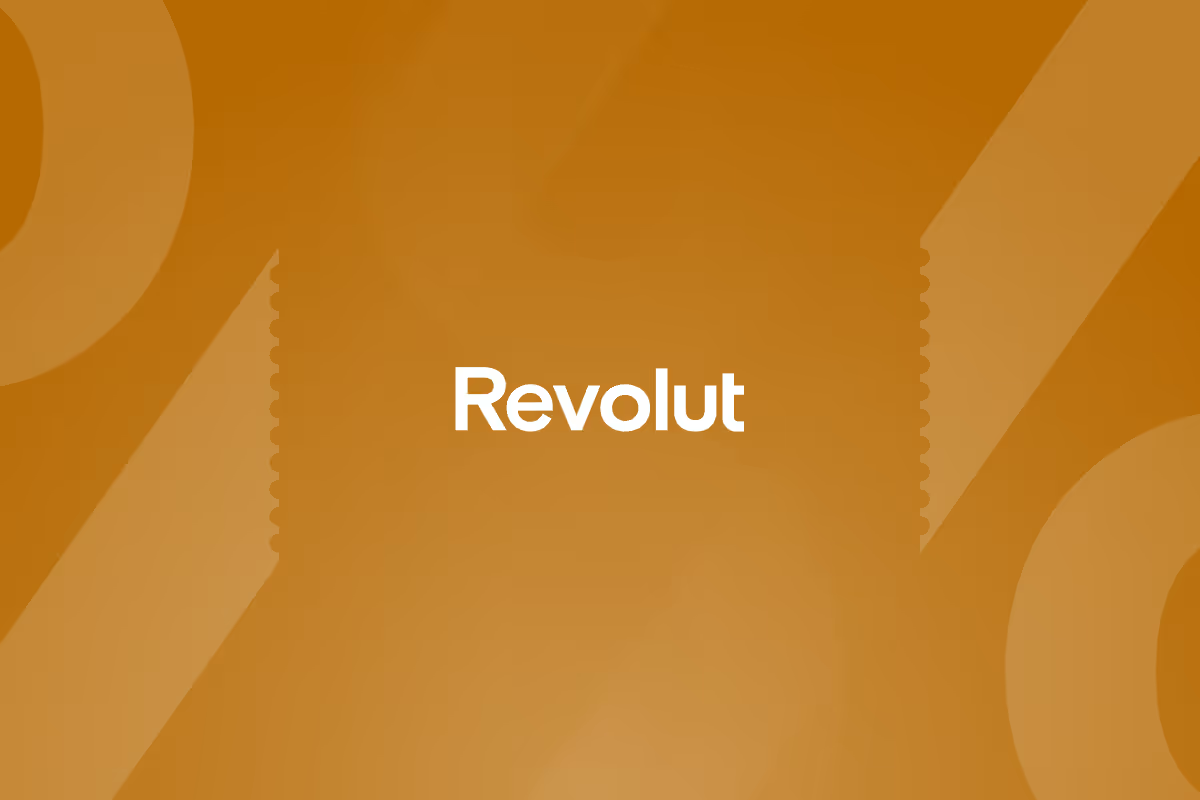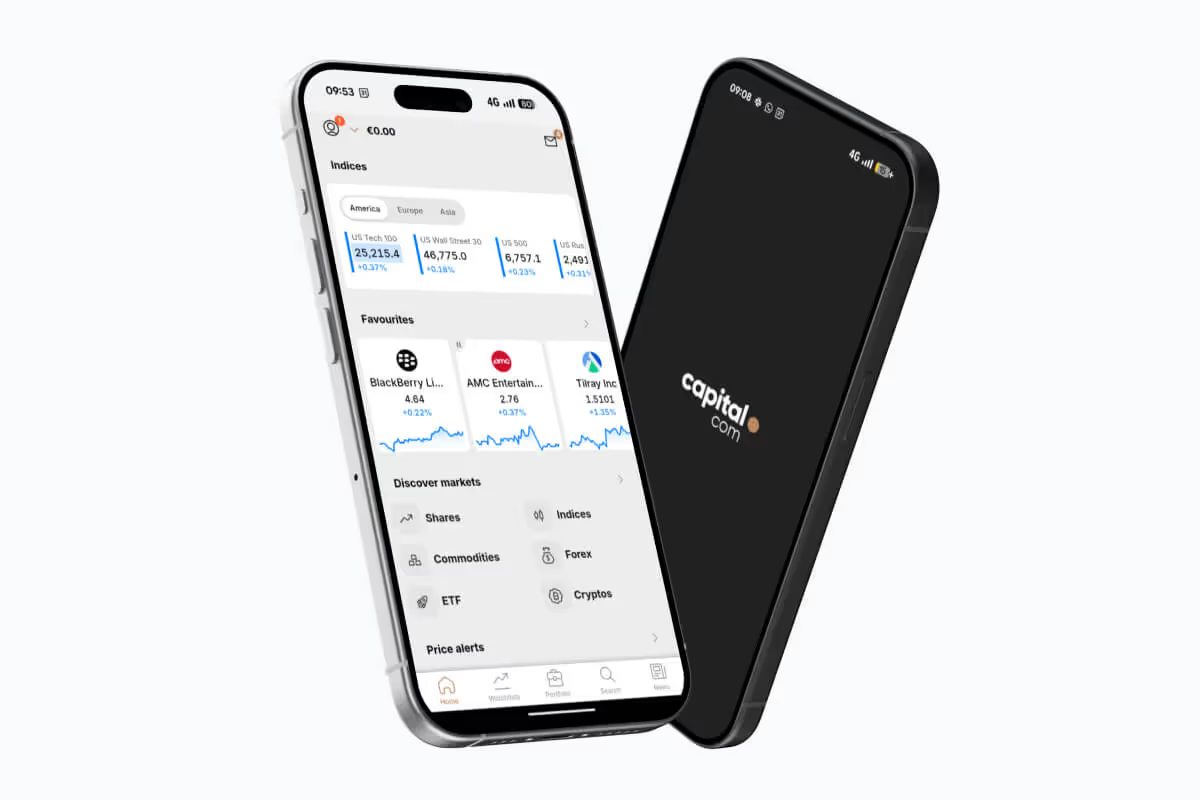9 Best trading apps and platforms in the Netherlands
.avif)


The world's first stock market was established in Amsterdam. So, as the home of investing as we know it, are there still great places for modern Dutch investors to put their money to work?
Whether you’re looking for a slick mobile app that’s easy to use, an efficient trading platform with customisable features, a low-cost, no-frills budget broker, or anything in between, welkom - we’ve got you covered.
Keep in mind, low fees aren’t the only thing to look out for - although they do certainly help. The real challenge is finding a trading app or investing platform that suits your individual style and needs as an investor.
In this article, we’ll explore what we consider to be the best trading apps and platforms in the Netherlands, analysing the pros and cons, investing features on offer, and who they are best suited for, helping you make an informed decision aligned with your financial goals.
The best brokers in the Netherlands
- Interactive Brokers: The most complete broker in the Netherlands. It may be complex for beginners.
- eToro: Best for investing in ETFs commission-free and to follow/copy other investors. On the downside, it's primarily a CFD broker.
- XTB: Best for commission-free stock and ETF investing (some conditions apply), plus CFDs. Good for forex/short-term traders.
- DEGIRO: A Dutch fan favourite. Great mobile app, strong reputation. On the downside, might be a bit more expensive than other contenders and doesn't pay interest.
- Trading 212: Best for beginners and earning interest on cash. Trading 212 is gaining popularity across Europe as a straightforward platform for investing. New users earn a free fractional share.
- Lightyear: Offers cheap investing, high interest rates, and an excellent app. New users can earn a free share. On the downside, it has a short track record (relatively new company).
- Trade Republic: Ideal for those just starting and looking to earn interest on uninvested cash. On the downside, it's also a fairly new company and engages in PFOF.
- Scalable Capital: An affordable option popular with Dutch nationals and expats.
- Bunq: A Dutch fintech neobank that recently launched stock investing.
For larger amounts, Interactive Brokers is a solid solution. It’s the broker with the highest level of assets under management and the most well-established.
Trade Republic and Trading 212 are great for earning interest.
If you’re a beginner or want to invest with low commissions, any of the other options are valid.
In addition to transaction fees, you may also encounter other costs, such as a connectivity fee or platform fees. In this case, DEGIRO is the only broker charging a connectivity fee (€2.50 per year per exchange).
Review of each broker
Interactive Brokers (IBKR)
- Minimum deposit: €0
- Currency conversion fee: 0.002% ($2 min.)
- Regulator in the Netherlands: Central Bank of Ireland (CBI)
- Demo account: Yes
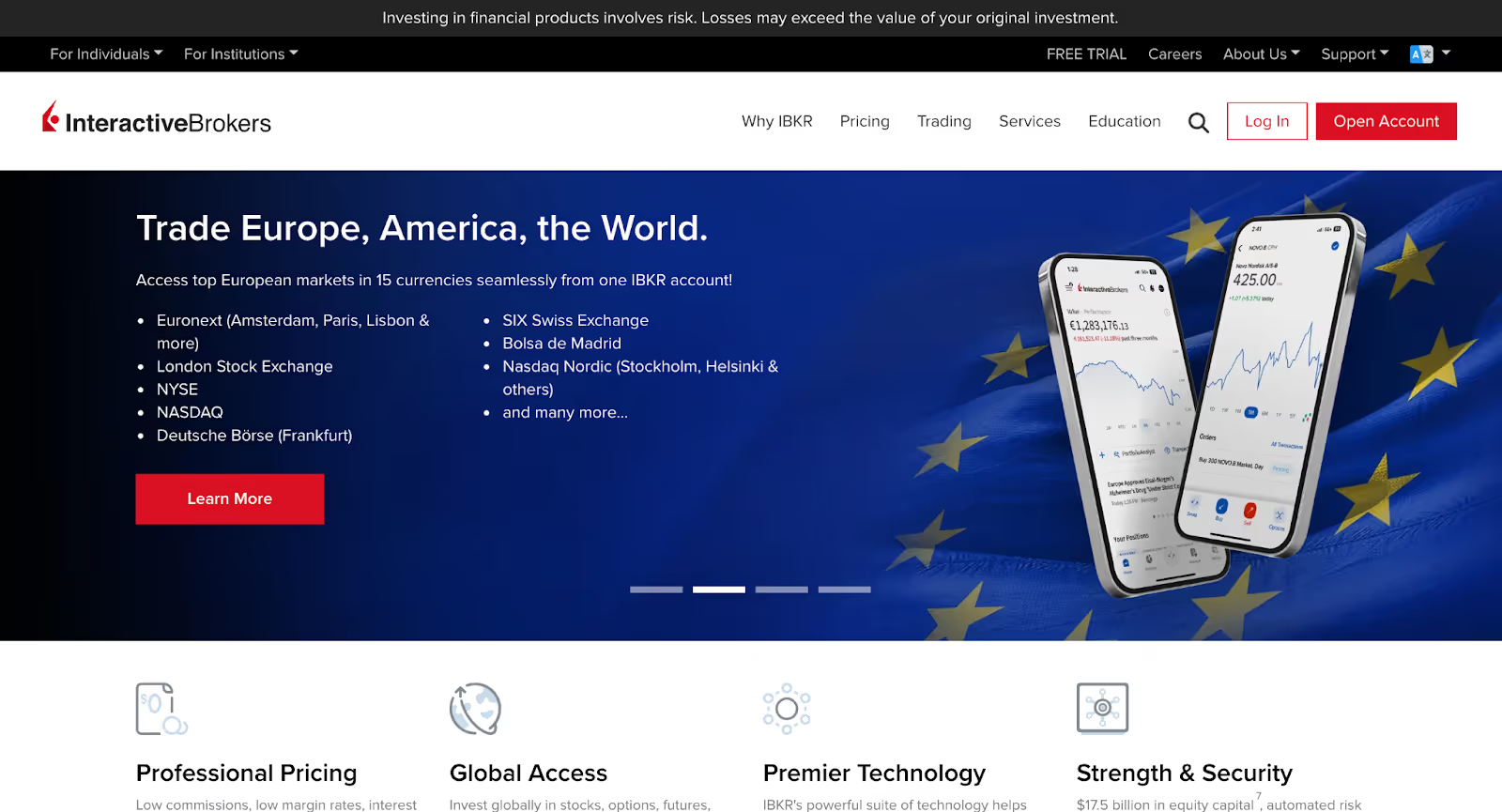
Founded in 1978 and listed on NASDAQ (ticker: IBKR), Interactive Brokers is one of the most renowned and innovative brokers globally. It’s the industry benchmark when it comes to top-tier trading platforms.
Its investment offering is unmatched in terms of global asset diversity, including stocks, ETFs, bonds, mutual funds, options, futures, and forex. For Dutch investors seeking international exposure or looking to actively trade, IBKR stands out as a premium choice.
Along with all the trading and charting tools you could possibly imagine, Interactive Brokers offers one of the most competitive fee structures available to Dutch investors. For US stocks, commissions start at 0.005$ per share ($0.35 minimum), while for European ETFs, costs are 0.05% of the order value (€1.25 minimum, €29 maximum). Alternatively, if you’re looking to invest in funds, Interactive Brokers offers a wide selection with zero commission, and others are €4.95 per trade.
In terms of regulation, "Interactive Brokers Ireland Limited," the subsidiary through which Dutch investors register, is regulated by the Central Bank of Ireland (CBI). Assets (including cash) are protected up to €20,000 as part of the Investor Compensation Scheme (ICCL).
Although the main platform (TWS WorkStation) is advanced and suitable for professional investors, there is also the "Web Portal" version and the "IBKR GlobalTrader" app, which are more suitable for beginner investors in the Netherlands.
In summary, Interactive Brokers is an excellent choice for Dutch investors and traders seeking a user-friendly, secure, and versatile platform for global investing.
Note: Interactive Brokers offers two commission plans: "Tiered" and "Fixed". The commissions mentioned here refer to the "Tiered" plan, which, based on our experience, is the most cost-effective option.
Pros
- Low commissions for US stocks
- No commissions for some funds
- Wide range of global assets
- Demo account available
- Excellent reputation (founded in 1978)
- Comprehensive research and educational tools
- Multiple platforms for beginners and experienced investors
- Supports multiple currencies and pays interest on uninvested cash
Cons
- Complicated and time-consuming account opening process (but entirely online)
- Steep learning curve for beginners
- Difficult-to-navigate website
- Calculating fees can be complex
- Not the most intuitive mobile interface
For a deep dive, check out our Interactive Brokers review.
eToro
- Minimum deposit: $50
- Currency conversion fee: 0.5% (EUR to USD)
- Regulator in Netherlands: Cyprus Securities and Exchange Commission (CySEC)
- Demo account: Yes
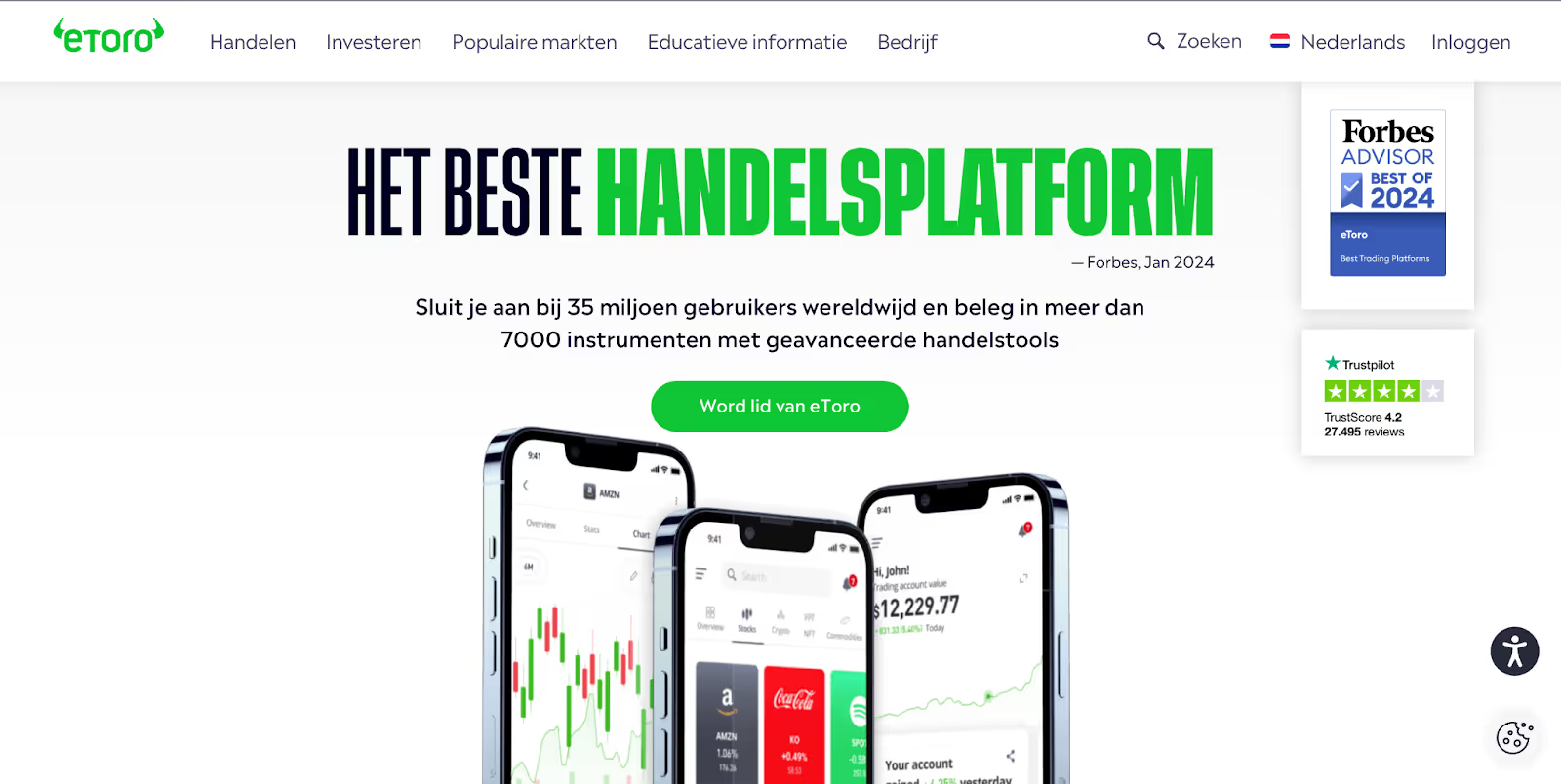
Founded in 2007, eToro has grown into one of the most widely used and beginner-friendly trading platforms globally. It recently went public with an initial public offering (IPO) listing on the Nasdaq exchange in the US (ticker: ETOR). It’s particularly well-known for pioneering social trading with its “CopyTrader” feature, which allows users to follow and automatically copy the trades of other investors.
For Dutch investors, eToro presents a compelling option, particularly for those new to investing or interested in global markets, cryptocurrencies, or copying the trades of others. The platform supports investing in stocks, ETFs, cryptocurrencies, and CFDs across various global markets. eToro has gained a loyal following in the Netherlands for its simple interface, low minimum deposit, and low commissions for stock investing.
eToro’s biggest strength is its zero commissions on ETFs, making it a cost-effective way for Dutch investors to build a diversified portfolio. However, it’s no longer completely commission-free with most stock trades costing $1, and trades on Australia, Hong Kong, Dubai, and Abu Dhabi exchanges costing $2 per trade. It's important to note that all accounts are USD-based, meaning a 0.5% currency conversion fee applies when depositing or withdrawing euros. This can be avoided if you deposit in Euros using eToro’s Money wallet.
In the Netherlands, eToro operates under a European license via CySEC, ensuring compliance with MiFID II regulations. This means investor protection is in place, with compensation available for up to €20,000 under the ICF (Investor Compensation Fund) in Cyprus.
The platform is best suited for casual and beginner investors, thanks to its intuitive app, ready-made “Smart Portfolios”, and active investor community. For those looking to try before committing funds, eToro offers a demo account with $100,000 in virtual funds.
In summary, eToro is an ideal choice for Dutch investors seeking a user-friendly platform with a strong community aspect, access to a diverse range of markets, and the ability to copy experienced traders.
Check our full review of eToro for European investors.
Pros
- Commission-free trading on ETFs
- Invest from $10
- Low commission for stocks
- Social and copy trading features
- User-friendly web and mobile apps
- Broad selection of cryptocurrencies and CFDs
- Demo account available
- Innovative thematic “Smart Portfolios”
- Regulated within the EU (CySEC)
Cons
- 0.5% EUR currency conversion fee on deposits/withdrawals - can be avoided by depositing using eToro Money wallet
- No access to Dutch stocks or full European exchange coverage
- Limited advanced charting and research tools
- Withdrawal fee of $5
- Inactivity fee of $10 per month after 12 months
- USD-only account base
- $50 minimum deposit
XTB
- Minimum deposit: €0
- Currency conversion fee: 0.5%
- Regulator in the Netherlands: Cyprus Securities and Exchange Commission (CySEC)
- Demo account: Yes
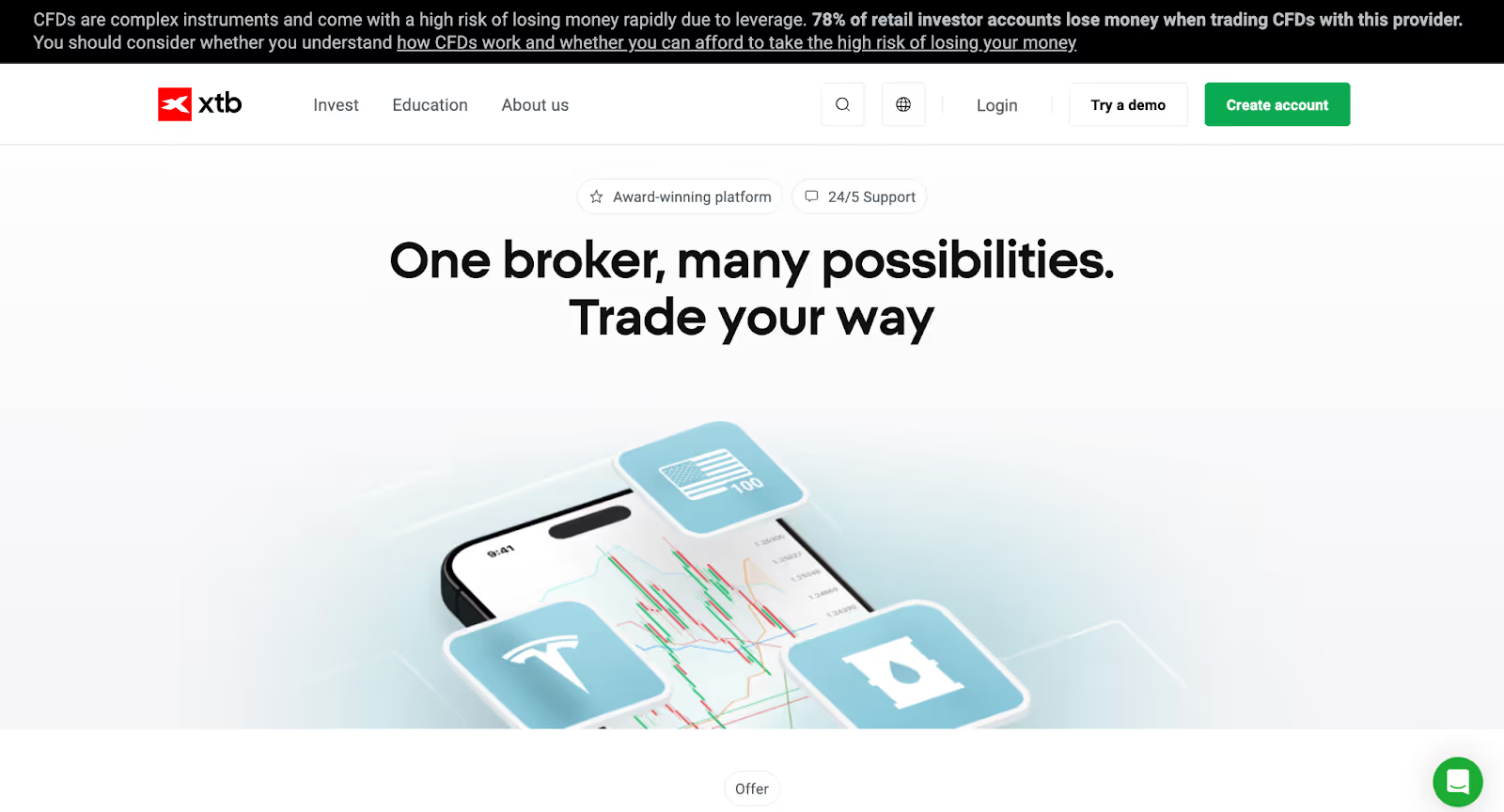
Founded in 2002, XTB is a publicly traded company listed on the Warsaw Stock Exchange and a global broker based in Poland, known for its robust trading platform and extensive educational resources. It offers a wide range of over 7,000+ financial instruments, including stocks, ETFs, forex, commodities, and indices. The platform is particularly appealing to active traders and those interested in CFD trading.
For beginners, XTB offers a demo account that allows trading with virtual funds, providing hands-on experience with the platform. XTB's popular trading platform, xStation 5, is user-friendly and equipped with advanced charting tools, making it suitable for both beginners and experienced traders based in the Netherlands. The platform is accessible via desktop, web, and mobile devices.
For Dutch investors, XTB offers commission-free trading on stocks and ETFs, with a monthly turnover limit of €100,000. Beyond this threshold, a commission of 0.2% ( €10 minimum) applies. The platform doesn’t charge any fees for account opening, maintenance, or withdrawals above €50.
XTB also pays interest on uninvested funds and offers an eWallet, which provides a multi-currency card, allowing you to make payments without any account maintenance fees. One downside is that XTB charges an inactivity fee of €10 per month after one year of no transactions, and if no deposits have been made in the last 90 days.
XTB, under the subsidiary “XTB Limited”, operates under the supervision of the Cyprus Securities and Exchange Commission (CySEC). Although it does not hold a local license in the Netherlands, Dutch investors can access XTB's services through the European Union's passporting system, which enables financial firms regulated in one EU country to operate in others.
In summary, XTB is a strong choice for Dutch investors seeking a comprehensive and robust trading platform with a wide range of instruments and educational resources, particularly for those interested in active trading and CFDs.
If you want to find out more, you can read our in-depth XTB review.
Pros
- Commission-free trading on stocks and ETFs (up to €100,000 monthly turnover)
- Advanced trading platform with comprehensive tools
- Wide range of tradable instruments
- Extensive educational resources
- No account opening or maintenance fees
Cons
- 0.5% currency conversion fee
- Limited product offerings for long-term investors
- Withdrawals under €50 cost €5
- Inactivity fee of €10 per month if your account is inactive for 12 months
DEGIRO
- Minimum deposit: €0
- Currency conversion fee: 0.25%
- Regulator in the Netherlands: Dutch Authority for the Financial Markets (AFM) and De Nederlandsche Bank (DNB)
- Demo account: No
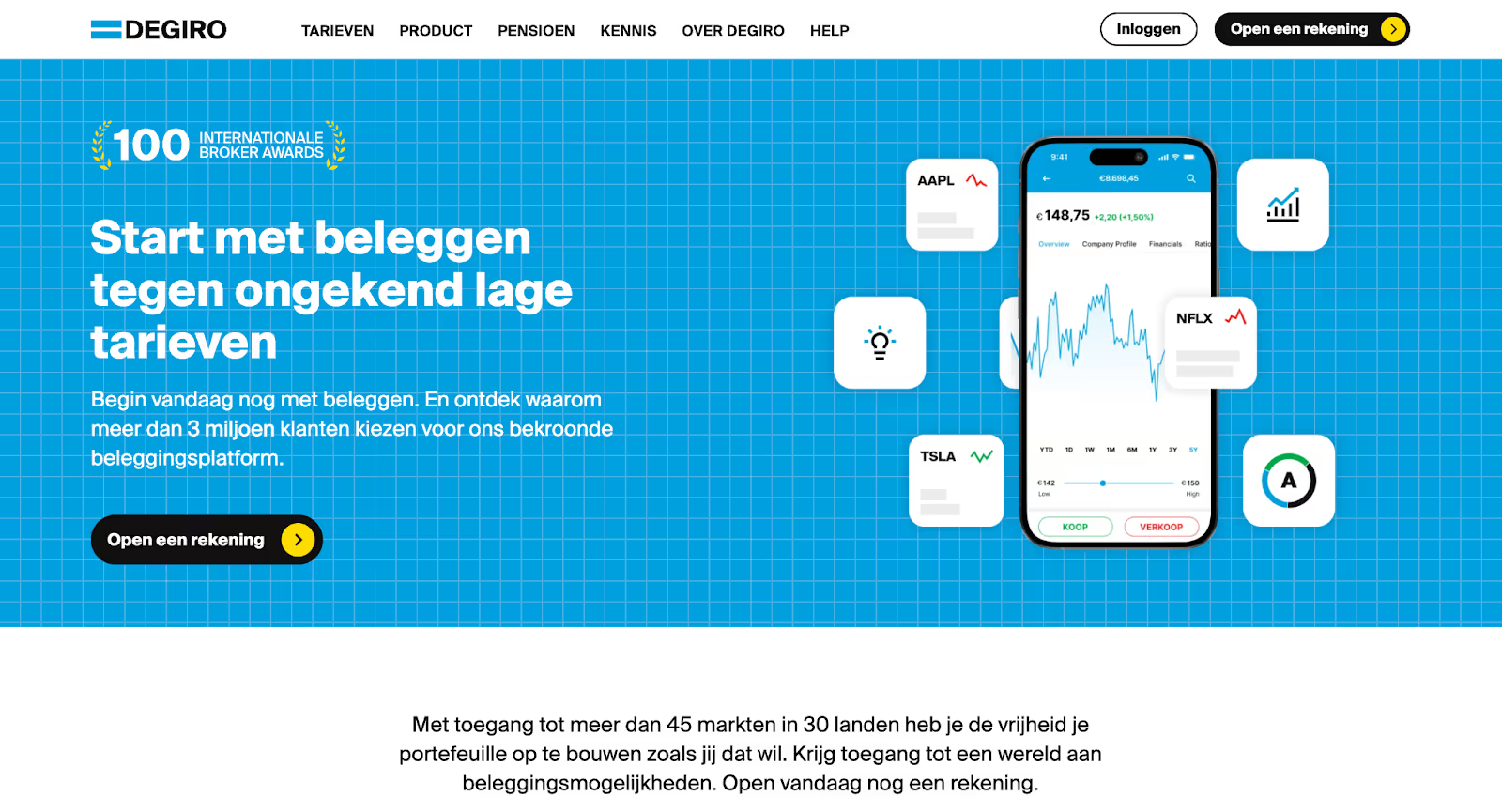
DEGIRO, founded in 2008 and headquartered in Amsterdam, the heart of the Netherlands, is a popular broker among Dutch and European investors. It offers a broad range of investment products, including stocks, ETFs, bonds, options, and futures, across various global markets. However, there is a unique annual connectivity fee of €2.50 per exchange.
The platform is best known for its low-cost fee structure, which offers competitive fees on trades and no additional charges for account opening, inactivity, or withdrawals. DEGIRO provides access to a selection of €1 commission ETFs through its Core Selection, although external fees may apply. Stocks listed on Euronext Amsterdam and global ETFs incur a cost of €3 (€2 commission + €1 handling), while US stocks cost €2 (€1 commission + €1 handling).
While DEGIRO does not offer a demo account, it provides plenty of educational resources through its Investor's Academy, helping investors understand various financial products and strategies.
DEGIRO operates as the Dutch branch of flatexDEGIRO Bank AG, which is primarily supervised by the German financial regulator BaFin. In the Netherlands, DEGIRO is registered with the Dutch Central Bank (DNB) and is under the conduct supervision of the Authority for the Financial Markets (AFM).
In summary, DEGIRO is an excellent choice for Dutch investors seeking a low-cost, no-frills brokerage platform with access to a broad range of global markets.
Read our complete analysis on DEGIRO.
Pros
- Low trading fees and transparent pricing
- Access to a wide range of global markets
- Cheap ETFs available through Core Selection
- No account opening, inactivity, or withdrawal fees
- Regulated by Dutch financial authorities
Cons
- 0.25% currency conversion fee
- No demo account available
- Limited customer support options
- No access to more complex assets
- Fee structure is quite unusual
- €2.50 connectivity fees for each exchange where you are invested
- Doesn’t pay interest on uninvested cash
Trading 212
- Minimum deposit: €1 (€10 for CFD accounts)
- Currency conversion fee: 0.15%
- Regulator in Netherlands: Cyprus Securities and Exchange Commission (CySEC)
- Demo account: Yes
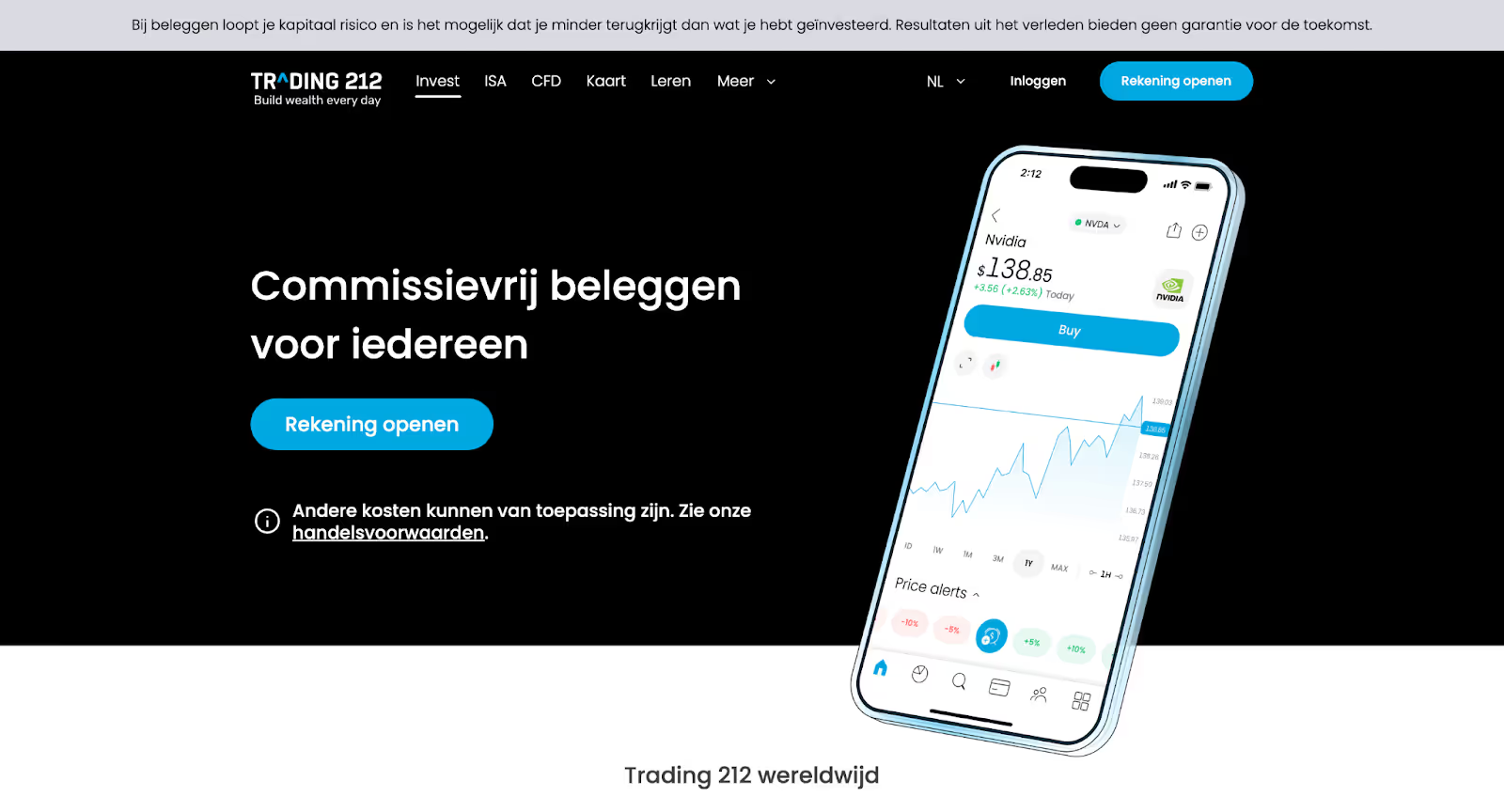
Trading 212 is a UK-based fintech company that offers commission-free trading on stocks, ETFs, and CFDs. The platform is designed to be user-friendly, making it suitable for beginners and casual investors just starting out. The platform also offers a free fractional share worth up to €100!
Opening an account is quick and easy. Within the app, you will have access to three different account types:
- Trading 212 Invest: Allows commission-free trading of stocks and ETFs.
- Trading 212 CFD: Allows trading of leveraged financial products (CFDs).
- 212 Crypto: For crypto investing.
One of Trading 212's standout features is its multi-currency account, allowing users to hold and trade in multiple currencies, potentially reducing currency conversion costs. It even offers a Trading 212 debit card, with no currency conversion fee for payments in different currencies. Additionally, you can earn 0.5% cashback on purchases, up to a maximum of €23 per month.
For Dutch investors, Trading 212 provides access to a wide range of European and US stocks and ETFs. The platform charges a currency conversion fee of 0.15% when trading assets in a different currency from your base currency. The platform also supports fractional share trading and offers an automatic investment system, as well as its “Pies”, which enable you to build and share custom portfolios.
In Europe, Trading 212 operates under the supervision of the Cyprus Securities and Exchange Commission (CySEC). While it does not have a local license in the Netherlands, Dutch investors can access Trading 212's services through the European Union's passporting system. Check our in-depth analysis on the safety of Trading 212 if you want to know more.
In summary, Trading 212 is an ideal choice for Dutch investors seeking a user-friendly platform with commission-free trading and features like fractional shares and Pies.
Pros
- Commission-free trading on stocks and ETFs
- User-friendly interface with mobile and desktop apps
- Supports fractional shares and auto-investing
- Multi-currency account reduces FX costs
- Demo account available
- Unique customisable Pies feature
- Offers a free fractional share worth up to €100 with a promo code
Cons
- Limited advanced trading tools for experienced traders
- Fairly limited range of asset types
- Customer support can be slow during peak times
Still not sure if Trading 212 is the right broker for you? Check our in-depth analysis.
Lightyear
- Minimum deposit: €0
- Currency conversion fee: 0.35%
- Regulator in Netherlands: Estonian Financial Supervision Authority (EFSA)
- Demo account: No
.avif)
Launched in the Netherlands in 2022, Lightyear is a European investment platform designed for simplicity and transparency. It offers no Lightyear execution fee trading on a range of ETFs and low commissions for stocks, making it an appealing choice for Dutch investors on a budget.
The platform supports fractional share trading for stocks and ETFs, allowing investors to buy portions of high-priced shares. With over 5,000 stocks available from the US, UK, and European markets, Lightyear is a solid option for gaining broad exposure to international stocks. The commissions are:
- European stocks: €1 per order
- UK stocks: £1 per order
- US stocks: 0.1% ($0.10 minimum, $1 maximum) per order
- ETFs: €0
It’s one of the slickest trading apps available when it comes to ease of use. There’s also plenty of free stock analysis packed into the app with access to financials and professional analyst opinions, for no extra cost. Lightyear has also made waves for offering some of the highest interest rates around on cash (whether that's Euros, Dollars, or Pounds).
Lightyear is regulated by the Estonian Financial Supervision Authority (EFSA). While it does not have a local license in the Netherlands, Dutch investors can access Lightyear's services through the European Union's passporting system.
Overall, Lightyear provides a straightforward and cost-effective platform for Dutch investors seeking no Lightyear execution fees when investing in ETFs, along with the benefits of low-cost trading in international stocks and high interest rates on uninvested cash.
Pros
- Commission-free trading on a wide range of ETFs
- Fractional share trading for stocks and ETFs
- User-friendly mobile and desktop apps
- Free deposits (via bank transfer) and withdrawals
- High rates of interest on EUR/USD/GBP
- Free in-app stock analysis insights
Cons
- No demo account available
- Limited advanced trading tools
- Customer support is only via email
- Small commissions for stocks
- Recent company (short track record)
Trade Republic
- Minimum deposit: €1
- Currency conversion fee: Not applicable (for investments)
- Regulator in Netherlands: Federal Financial Supervisory Authority (BaFin)
- Demo account: No
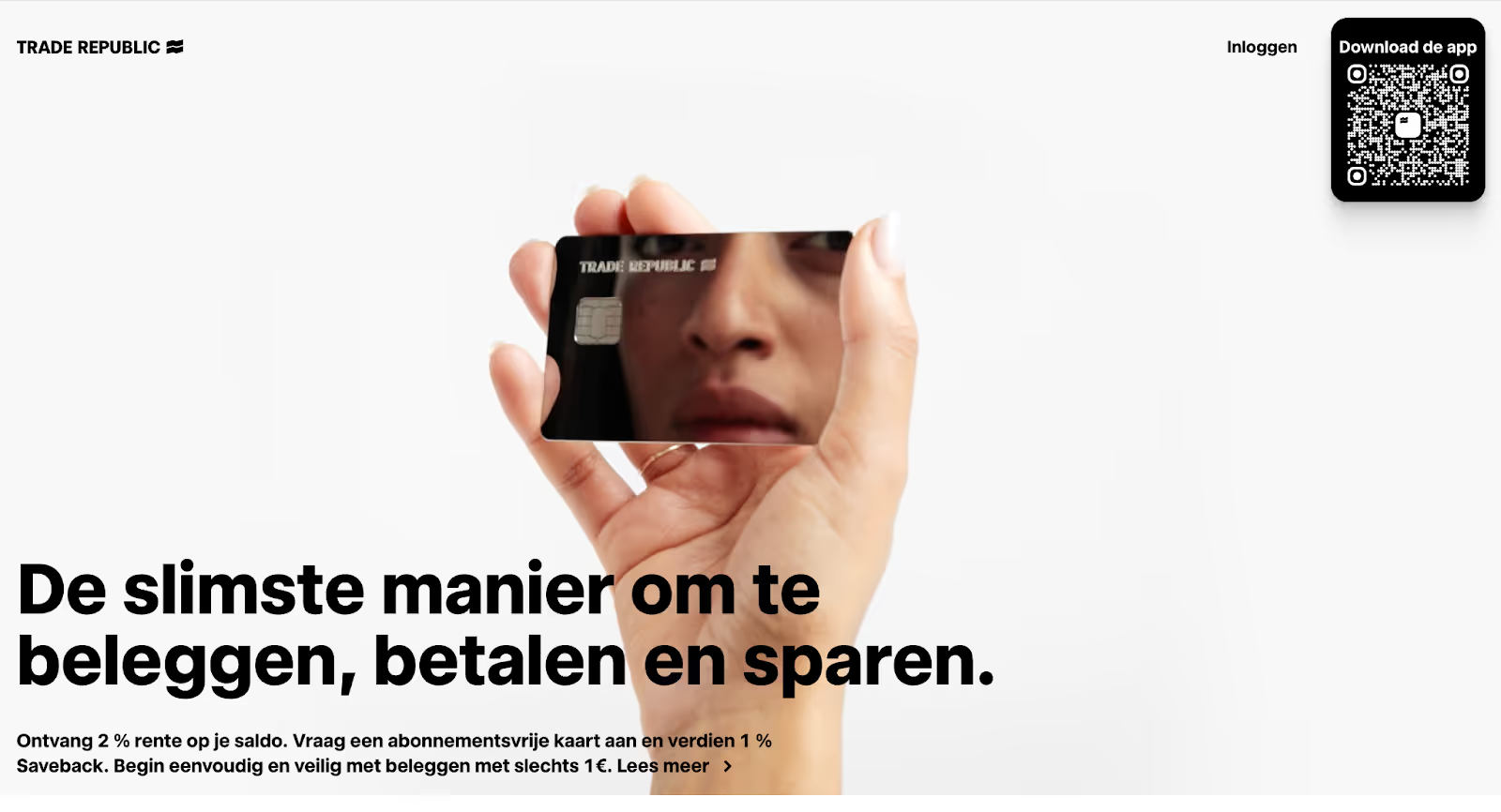
Founded in 2015, Trade Republic is a low-cost broker based in Berlin, Germany. It focuses on five types of financial assets: stocks, ETFs, bonds, cryptocurrencies, and derivatives.
Adopting the slogan "The smartest way to invest, spend, and save", Trade Republic stands out as a commission-free platform for Dutch investors. However, it applies an external settlement fee of €1 per transaction (except for savings plans), meaning that, in practice, you will pay at least €2 (€1 to buy and €1 to sell). Despite this, it remains competitive, although not entirely fee-free. You can also invest in corporate and government bonds starting from just €1.
It also offers a virtual debit card (free), a Classic card (€5 to order), and a Mirror card (€50 to order). If you withdraw more than €100 from ATMs, you pay no fee. If you make a purchase in a currency other than euros, the exchange rate applied is the market rate. It also offers unlimited 2% interest on uninvested cash in your current account.
Trade Republic operates under the supervision of the German Federal Financial Supervisory Authority (BaFin) and the Deutsche Bundesbank. While it does not have a local license in the Netherlands, Dutch investors can access Trade Republic's services through the European Union's passporting system. If you want to know more about the security of the platform, you can read our article analyzing Trade Republic's safety.
To summarise, Trade Republic is a compelling option for Dutch investors seeking a low-cost, mobile-first platform with a broad range of investment products, other financial capabilities, and attractive interest rates on cash.
Pros
- Investments starting from €1
- Commission-free savings plans for stocks and ETFs
- High interest rates on uninvested cash
- Wide range of investment assets
- User-friendly mobile app
- Automatic savings plans
Cons
- Fixed external fee of €1 per transaction (except for savings plans)
- No demo account
- Customer support is limited to email
- Additional fees for outgoing transfers of investments (€25 per position)
- Only one base currency (EUR)
- No direct access to U.S. stock exchanges
For a complete picture of Trade Republic, read our full review.
Scalable Capital
- Minimum deposit: €1
- Currency conversion fee: N/A (European investments only)
- Regulator in Netherlands: Federal Financial Supervisory Authority (BaFin)
- Demo account: No
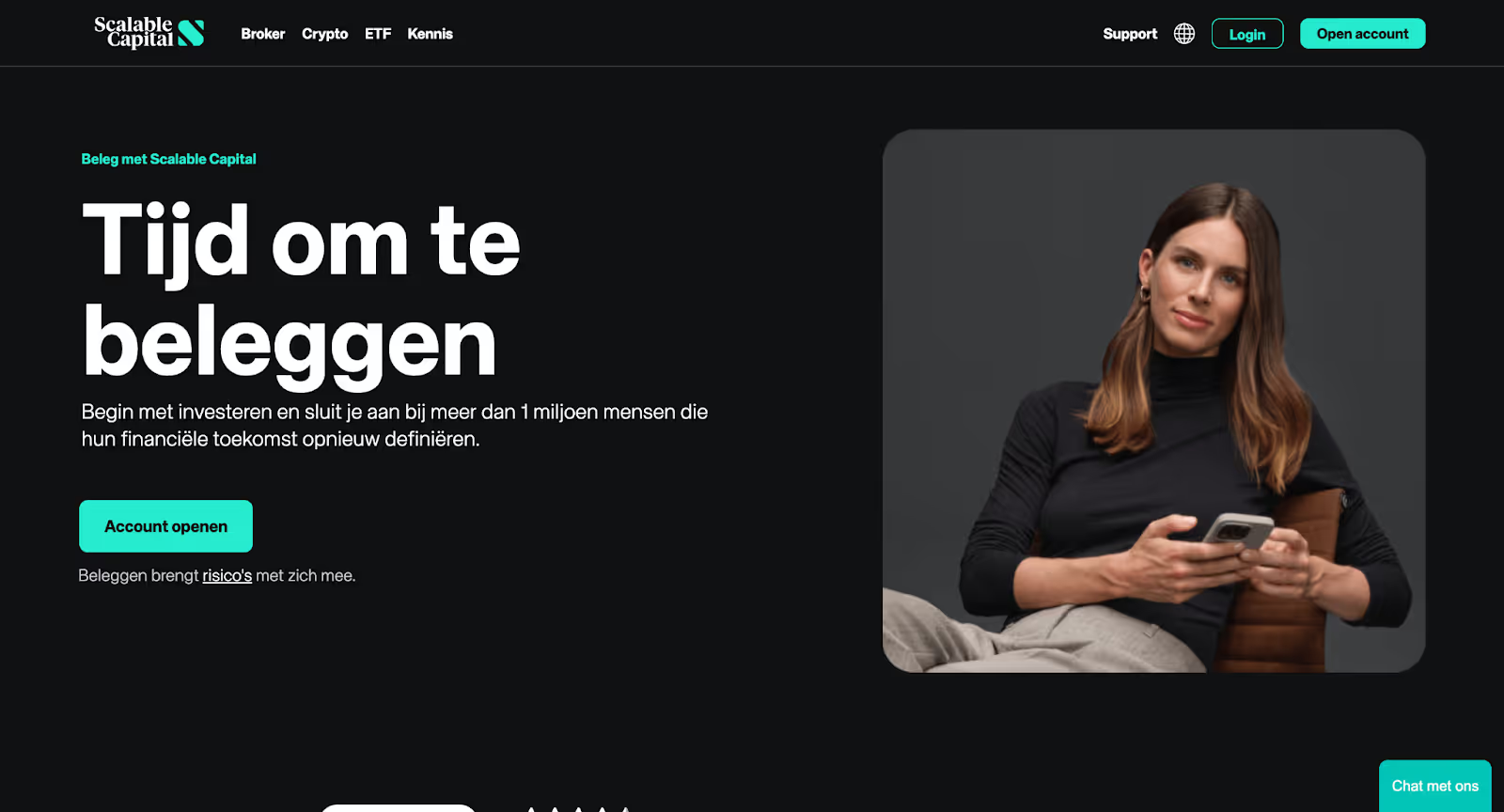
Scalable Capital is a German-based investment platform with over 1 million users, offering a low-cost brokerage platform for Dutch investors. It provides access to a wide range of ETFs, stocks, and cryptocurrency, with a focus on long-term investing. Unfortunately, the automated robo-advisor service isn’t yet available to investors in the Netherlands.
The platform offers a solid 2.25% interest on uninvested cash and savings plans starting from €1. There are over 8,000 stocks, 2,300 ETFs, and 1,900 funds - so plenty of choice to help you build a diverse portfolio.
The free account with Scalable Capital costs a flat €0.99 per trade, making it excellent value if you’re placing larger trades. But, it’s €0 for purchases of PRIME ETFs (all Amundi, iShares, Xtrackers ETFs) of €250 or more. If you subscribe to PRIME+ for €4.99 per month, you get access to more analyst insights and €0 for trades of €250 or more, otherwise €0.99.
However, the small print is a bit sneaky with Scalable Capital. For investments bought and sold on the Xetra exchange, a €3.99 order fee applies to all clients, including those using the PRIME+ Broker. Additionally, a trading venue fee of 0.01% of the executed volume (with a minimum of €1.50) is charged.
For Dutch investors, Scalable Capital offers a user-friendly interface and access to European markets. Scalable Capital is regulated by the German Federal Financial Supervisory Authority (BaFin) and the Deutsche Bundesbank.
The bottom line is that Scalable Capital is a strong option for Dutch investors seeking a cost-effective platform (with a slightly complex fee structure) that offers a wide range of investment assets. However, it is expensive if you want to invest in the Xetra exchange.
Pros
- Flat-fee €0.99 pricing model for many investments
- Access to a wide range of investments
- User-friendly platform with excellent mobile app
- High interest paid on cash
- Savings plans from €1
Cons
- 0.15% Currency conversion fee
- No demo account available
- Limited access to non-European markets
- €4.99 monthly fee for PRIME+
- Robo-advisor not available in the Netherlands
- Additional fees for trading on the Xetra exchange
bunq
- Minimum deposit: €0
- Currency conversion fee: 0.5%
- Regulator in Netherlands: De Nederlandsche Bank (DNB)
- Demo account: No
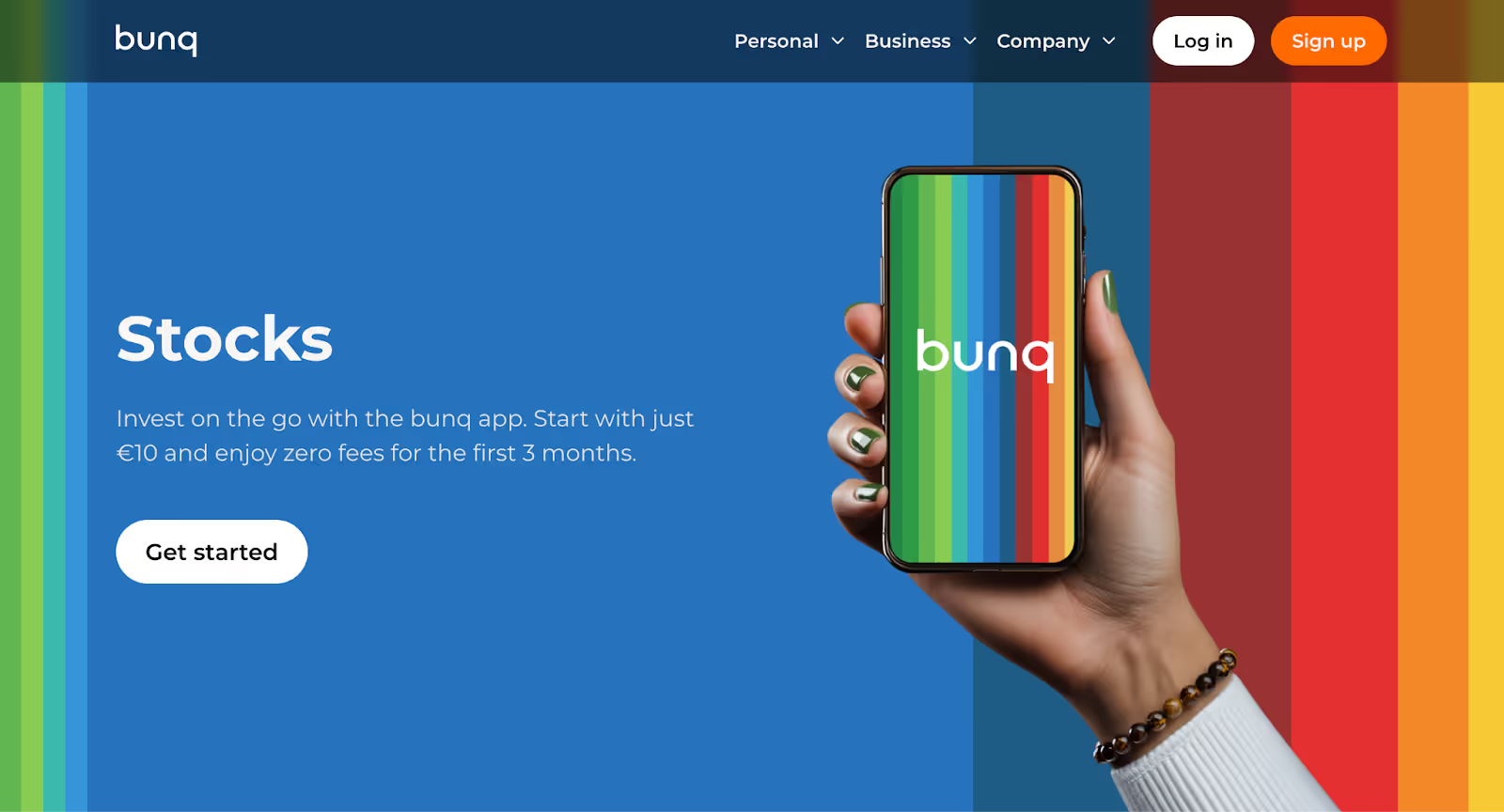
Founded in 2012 and headquartered in Amsterdam, bunq is a Dutch neobank offering a fully digital banking experience across the European Economic Area (EEA). Known for its user-friendly mobile app, bunq provides a range of personal and business banking services, including current accounts, savings accounts, and investments.
With bunq, you can invest in a range of stocks, ETFs, and cryptocurrencies. For stocks and ETFs, there are no commission fees for the first three months, after which a 0.99% fee per trade applies. Bunq offers four different plans:
- bunq Free: €0 per month
- bunq Core: €3.99 per month
- bunq Pro: €9.99 per month
- bunq Elite: €18.99 per month
For the most part, the perks of the paid plans relate more to your overall finances, rather than just investing. However, Pro users receive a 20% discount on trading commissions, and Elite users receive a 50% discount (plus, lower crypto trading fees).
Bunq operates under a full banking license issued by De Nederlandsche Bank (DNB). As a Dutch bank, it is subject to Dutch financial regulations and oversight. Customer deposits are protected up to €100,000 under the Dutch Deposit Guarantee Scheme (Depositogarantiestelsel). However, investments are held under a German entity, regulated by BaFin.
Keep in mind that although bunq offers an investing service, its primary operations are those of a fintech bank. It’s particularly popular with expats living in the Netherlands, but it’s not as well-rounded as some of the other trading apps and platforms we’ve reviewed here.
Pros
- Fully digital banking experience with a user-friendly app
- Competitive interest rates on savings accounts
- Accessible investment options for beginners
- Multiple sub-accounts with unique IBANs
- English-language support, beneficial for expats
Cons
- Monthly subscription fees across premium plans
- Limited customer support options, primarily via in-app chat
- No physical branches for in-person service
- It’s a bank first and brokerage second
- Investment options are limited
Criteria for the best brokers in the Netherlands
The summary of the broker selection in the list above was based on criteria that, in our view, meet the needs of most investors reading this article.
With that in mind, here are the factors considered:
1. Security and asset protection (including uninvested cash)
All selected brokers available in the Netherlands are regulated by a European Union country. We also analyzed fund protection mechanisms, such as deposit insurance or account segregation, to ensure that investors' assets are properly safeguarded.
2. Costs and fees
Costs can significantly impact any investor's returns. We evaluated trading fees (including spreads and commissions per trade), inactivity fees, currency exchange fees, platform fees, and any other associated charges. Priority was given to brokers with competitive costs or even commission-free structures for certain products, such as stocks and ETFs.
3. Variety of available products
The diversity of assets available is crucial for catering to different investor profiles. We considered platforms that offer Dutch investors a broad range of products, including stocks, ETFs, bonds, and more specialised products such as CFDs (derivatives) and cryptocurrencies.
4. Ease of use
User experience is crucial, especially for beginners. We evaluated the platform's usability, from account registration and deposit process to trade execution and advanced features for experienced investors. Simple and intuitive interfaces were considered a positive factor.
5. Quality of customer support
Customer support can make a difference in critical situations. We analyzed availability, speed, and effectiveness in resolving issues, as well as the available communication channels (chat, email, phone).
Investor compensation scheme
The Investor Compensation Scheme (ICS) is the last safeguard for investors. When everything goes wrong, the ICS steps in to provide protection.
In the table below, we highlight the regulators of origin for each broker and the coverage limits (those applicable to European investors):
Which broker to choose in the Netherlands?
Choosing the best broker available to Dutch investors is not a simple task, but ensuring security, cost-effectiveness, and convenience in your investment operations is essential. There is no "perfect" Dutch broker; each has its strengths and weaknesses.
Interactive Brokers is an excellent choice for those seeking a comprehensive and robust solution for diversified investments. For those who prefer simple and accessible platforms, brokers like Trade Republic, XTB, Trading 212, or Lightyear are good options. However, if you want to access more niche assets, such as crypto, it might be worth checking out eToro, Scalable Capital, or bunq.
Regardless of your choice, it’s essential to consider factors such as security, costs, and available features when picking the best trading app or platform for your needs. Remember that a well-informed decision today can have a lasting impact on your investment portfolio. Carefully evaluate your options and choose the broker that best suits your needs and financial goals.



